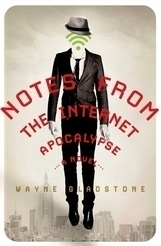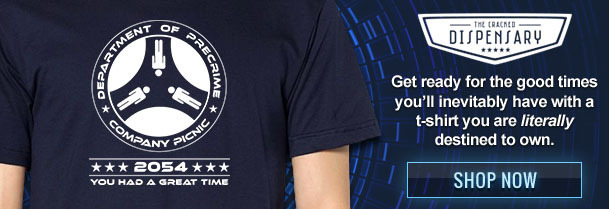5 Ways the Internet Steals Your Soul

The Internet changed my life. Without the Net, I never would have gotten into comedy writing, I never would have met some of my closest friends, and I most certainly never would have published my novel Notes from the Internet Apocalypse, available on sale now. Using the Net as a scalpel, I carved myself a new virtual life, a new identity that I've slowly been merging with over the last decade.

You can still tell it's me, around the eyes ...
I'm grateful for all the Net has brought me, but if I'm honest, I have to admit it takes just as much. Actually, if you're not careful, it takes a lot more. I'm not talking about government intrusion into privacy rights or corporate interests data-mining your life for profit, although those are all important and valid concerns. There's more at stake every time you go online, because the Internet can claim your soul.
Maybe that sounds melodramatic, but I don't think it's an overstatement. After all, think of all the things the Net has the power to make you do, and all the things it keeps you from doing. When you step back will you recognize what you've become? The Net has the power to reshape you.
The Internet Makes You ... Only Smart Enough for Apathy
Like the biggest library you've ever seen, the Net is filled with facts and data. There are crucial differences, however. First, the Net has far more false data than most libraries.

Except as compared to "Chuck's Library of Totes True Facticles," located outside Lincoln, Nebraska.
You have to be careful what you accept as fact in life and especially on the Net, but there is a larger and more insidious difference between the Internet and real books: The Net is easy. I know that sounds like a good thing, and it certainly can be, but easy access to data -- even accurate data -- is a double-edged sword. The best of us use this ease to acquire more and more information, from a greater variety of sources. You can wiki something, as a starting point, and then click on linked footnotes. You can read those underlying sources and move on to essays and investigations. You can take that conflicting and varying data and analyze it to form your own conclusions. That is all true, and all of that impressive scholarship from the days of academic book-learning and micro-fiche investigations can be brought into the 21st century and improved. So yes, you can do all that, or ... you can just ask Siri.

"Siri, is global warming a myth?"
Instead of using the Net as a tool to cut more deeply into data, most of us have become part of a culture interested in knowing just enough. Indeed, most people use the Internet to find out what they don't need to know. Oh, there's a new story about NDAA that can jeopardize our notions of the constitution? What's this debate about global warming? The Internet can tell you just enough to let you not worry about something. Even this very site has given you content that could be used as a justification for learning more or not caring about either of those topics.
The Net fosters lazy scholarship. Back in the day, to get the amount of information you can now get in an hour you would have to be some sort of grad student spending a full week in a library, reading whole chapters or textbooks assisted only by an index or table of contents, at best. You'd be forced to gain more information, full information, in your effort to find the one fact you were looking for. But now, with the assistance of search engines, it's easier than ever to cherry-pick those facts that best suit your pre-existing notions.
You can't always blame the Net for that. The choice belongs to people, but when you give the majority of people the ease and convenience of the Net, it's not surprising most will use it in a way that will expedite their ease and convenience. They will gobble up just enough info to spit out a factoid. Just enough information to say, "Yes I know that." Just enough information to leave a Reddit opinion or know whether to "like" something on social media. The Net helps you have just enough information to confirm what you already thought you knew or stop learning altogether.
The Internet Makes You ... Only Strong in the Dark
J.D. Salinger said novels grow in the dark. So do some helpful forms of mold and bacteria. And that's about it for good things. Just about everything else that grows in darkness is bad for the world.

That sandwich that fell behind your dorm room dresser last semester, for example.
And something that's good at growing in darkness, is a bully. The Internet is great at growing those because it provides darkness in two ways: by keeping you anonymous and allowing you to team up with other like-minded terrible people. It's like a Klan meeting, but with more GIFs of cute kittens.
I don't really need to explain this too much, because anyone who's ever read the comments section on a website will understand. People like to be terrible, and the Net makes it easier to be terrible. It lets them put their cruelty out into the world without the burden of being tethered to it. They are released, and they sprint happily across the World Wide Web dropping little nuggets of awful without consequence.
Or if you're not prone to reading comment threads, surely you've heard of the cyber-bullying phenomenon. In researching this article, I found a BuzzFeed list of nine teenage suicides from last year all purportedly caused cyber-bullying. So, safe to say, at this point no one needs to be told the problem is real. But before this tragedy devolves to a GIF-based day of remembrance, perhaps it's helpful to remember the case of Megan Meier, a 13-year-old girl from Missouri who killed herself in 2006 after being courted and abandoned by a fictitious MySpace account.
Megan had been under a psychiatrist's care, dealing with myriad problems, some of which involved her low self-esteem since the third grade. Anyway, you know how this goes. Megan gets happier when a supposed 16-year-old boy takes an interest in her and kills herself once abandoned. The part of the story that's truly noteworthy, however, is that the account was registered to Lori Drew, the mother of a girl with whom Megan had had a falling out. Yep, a fully grown woman, allegedly human, was aided by teens in using a hoaxed account to get information about Megan. It was Drew's intent to use this information to later humiliate Megan for allegedly spreading gossip about Drew's daughter.
Has the Net made people more awful? Impossible. That's like drawing horns on a picture of Hitler -- doesn't add a lot. But the Net is a tool for the awful who already exist. And it provides a safe haven where they sharpen their cyber-weapons in the dark.
The Internet Makes You ... Only Calm Enough to Do Nothing
The other day I was eating some lunch at a soup place downtown, when I overheard two young women, in finely pressed business suits, discussing their work day. Without wanting to, I heard all about their office strategies, career path choices, and financial contingency plans. And although their words were hampered by thick New York accents and colored by youthful bravado, it seemed pretty clear to me that these women would succeed in life. They wanted to. They were driven. It was what they cared about. And do you know what my reaction was? It stressed me the fuck out.

I fixed the problem by dousing them with my chicken vegetable, but what about next time, when I don't have soup?
I had just come from a stressful office environment. All I wanted was 30 minutes alone with a steaming lunch and no thoughts of any importance. But I couldn't guarantee that in the real world. In the real world, you hear those voices, see those reminders, and if you're like me, it stresses you out sometimes. Talk of finances, stocks, and the like imposes a pressure to be a grown-up. To take stock of your own life and ask yourself why the fuck don't you have a portfolio or a plan.
But online, you can always find your own quiet corner where people are talking about nothing. And it's easy to stay there because look how many millions are also doing nothing with you. And they're not starving to death or homeless, so it must be OK. You'll all do nothing together. No demands, no decisions, and even the most vitriolic debates are over topics as transient as the packets of information traveling along fiber-optic cable. A place where you can pretend to do things, whether it's tweeting the weather, tagging some photos, or building a collage. It's work. The kind that leaves you with a slower pulse, but no other tangible reward, and one more day lost.
There's a lot of that in my novel, which is totally available for purchase now. Plus it's a sci-fi, noir mystery. And a love story. With dick jokes too, and there is absolutely no law against watching the trailer for it written by me, directed by Randall Maynard, edited by Michael Swaim, scored by Konrad Payne, and starring Dylan Seaton. (Also: Director of Photography: E. Gustavo Petersen, Sound: Barry Neely, Producer: Angela Tafoya.)
The Internet Makes You ... Only Kind When It's Easy
If charity begins at home, then often it ends there too -- at least if you're on your laptop. I'm not pretending to be holier than anyone. I would not want to get into a competition about how much or how little I've done for humanity. But I do know a big part of the Internet is about the appearance of being good. We like pictures of bravery. We hashtag RIPs. We disseminate information on charities more than we donate. And the notion of volunteering starts to become almost surreal.

"This is cool, but could we Skype it out?"
Again, the Internet didn't create this condition. There are selfless, saintly heroes. I have seen them. They exist, but the rest of us are just people. People who need a fair amount of shame and disgust to be motivated. People who need to be shocked into action. And people who are lazy. When you add a device that allows people to feel good about themselves with minimum effort, you give them an incentive not to do more. And the Internet is sensational at that.
Ooh, look at me. I shared a link about substance abuse the day Amy Winehouse died! Check me out sponsoring this walkathon for five bucks! Awww, #RIP Jack Klugman!
And while some nonprofits are attempting to increase profits by using social media to reach out to a younger audience willing to give, there also has been an observed psychological phenomenon commonly called "slacktivism" -- a kind of Internet-fostered act of non-giving.
A study from the University of British Columbia's Sauder School of Business found that the more public the primary show of social-media endorsement, the less likely people were to provide meaningful support later. Conversely, if they supported a cause in a more confidential way, they were more likely to give money later. Essentially, the appearance of charity becomes its own reward, instead of a desire to make a difference or cause a personal effect in the world.
The Internet Makes You ... Only Content Enough to Keep from Rebelling
The Internet loves the idea of revolution. Y'know, Anonymous, V for Vendetta, Wikileaks, and all that. But in many ways, the Internet actually helps perpetuate the status quo. Let me explain. I don't think it's too controversial a statement to say that, for the most part, the world has been controlled by the very rich. Whether it's kings, robber baron industrialists, or the richest 85 people on Earth (who have as much wealth as 3.5 billion of the world's poorest people), extreme wealth means power, and that power is limited to a decreasing few.
How is that sustainable? Well, actually there are lots of reasons. For one, humanity doesn't have a great history of applying the principles of socialism too kindly either, so most Americans aren't exactly lining up for that. And then there's the stumbling Occupy movement, who seem more concerned with protesting financiers than politicians. What's the point of that? A capitalist has one job: to make as much money as possible. You're not going to change a capitalist, and you shouldn't try. You just ask government to protect you from the unbridled abuses of capitalism. That's why we have child labor laws, the minimum wage, and work safety requirements. As I've written before, deriding capitalists for greed is like picketing wild animals for eating meat. When the lions break free, it makes a lot more sense to scream at the zoos who have the responsibility for maintaining cages. You can try to yell at the lions if you really want to, but if they listen at all, it's just because they're taking a second to decide which part of your body to devour first.

"Oh, I see. You're saying some of our lending policies are not ethical. Interesting. Say, could you do me a favor and roll around in some crushed black pepper? Oh, no reason."
But there's another reason the ruling class continues to rule: It's because for most of history -- until things reach a breaking point -- we're comfortable enough to avoid revolution. There are a handful of things that maintain that balance. Things that let honest men and women, working harder for less, get up in the morning and go to their shitty jobs without driving to the nice part of town and eating the rich instead. And at this point, with the divide between rich and poor at increasingly large levels, I fully believe there are three things keeping society from tearing itself apart: religion, organized sports, and the Internet.
I don't want to spend too long on the first two, because it's nothing you haven't heard before and you don't need to take a hostile view of either sports or religion to see its ability to provide solace to the masses. Like sports, the Internet can be a huge distraction, helping you ignore the 50 hours a week you spend in a cubicle for increasingly awful health insurance and diminishing prospects of sending your children to college.

Crippling, reality-based depression? There's an app for that.
And like organized religion, the Net definitely facilitates certain people's love of building self-esteem by condemning others, but the Internet also has its own special populace-calming powers. First, in a persistently terrible economy, the Internet helps us steal. That's important, because (and I'm sorry for being technical) most of us are broke, but we still like stuff. Torrents and illegal downloads and streams really do ease people's suffering. Does that make theft OK? Not really, but this isn't about judgment. It's about reality.
But there's a bigger point. As long as you've got enough money for some Wi-Fi, you can enjoy the Internet in the same way as the power elite. In a weird way, the Net makes you feel rich. You know Bill Gates has seen LOLcats. Without question, Warren Buffet has bookmarked Two Girls One Cup. And, I feel it's a safe bet that a twat like Shia Labeouf still enjoys a good Rick Roll. The Internet is a common denominator. Something that unites the very rich and the very poor. Rich people have better food, they have sex with hotter people, they drive nicer cars, they have fancier homes, they get better health care, they have every advantage you can think of, but they don't get better Internet programming. Right now, someone who can buy and sell me a million times over and someone who's stealing their neighbor's Wi-Fi are both reading this.
That makes us feel good, or at least content. Content enough, let's say. We're not serfs after all. We have comforts just like the ruling class. So, for all its power, for all its possibility, the Net succeeds most in promoting apathy. In fostering stagnation. That's not the Internet's fault. It's ours. But its power is still waiting to be tapped. And it seems to me that Charlie Chaplin's speech from The Great Dictator about Fascism and the promise of technology is somehow even more true today than it was more than 70 years ago when he first made it:
"The aeroplane and the radio have brought us closer together. The very nature of these inventions cries out for the goodness in men -- cries out for universal brotherhood -- for the unity of us all.
"Machinery that gives abundance has left us in want. Our knowledge has made us cynical. Our cleverness, hard and unkind. We think too much and feel too little. More than machinery, we need humanity. More than cleverness, we need kindness and gentleness."

GLADSTONE'S NOTES FROM THE INTERNET APOCALYPSE IS ON SALE NOW!
After experiencing the joy of pre-ordering Book 1 of the trilogy, be sure to follow Gladstone on Twitter.
Also, you can get all your Internet Apocalypse news here as we count down to release.
Always on the go but can't get enough of Cracked? We have an Android app and iOS reader for you to pick from so you never miss another article.
